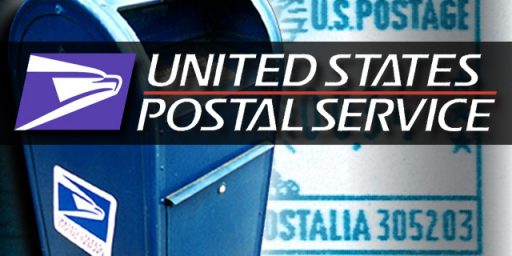Postal Service Bars Newspapers That Advertise Marijuana From The Mail, Even Where It’s Legal
The Post Office is saying that it will not accept for mail any publication that includes ad for marijuana, even in states where it has been legalized.
Newspapers and other periodicals in states that have legalized marijuana can’t run ads for marijuana businesses because the United States Postal Service says so:
The U.S. Postal Service issued a policy for newspapers in half the states last week that says they’re breaking the law if they mail any issues containing ads for marijuana products, even though the states have legalized pot.
This parsing of federal law, released by postal officials as national policy after inquiries from Oregon’s congressional delegation, is one of the messy consequences of the movement to legalize cannabis: It’s bought, sold and advertised for recreational and medical use in some states, but still illegal under federal law.
The confusion started in Portland, Ore., where local newspapers have been running ads for dispensaries and manufacturers in the state’s now-booming weed industry after voters legalized recreational pot for adults last year, following medical pot in 1998.
In November, Portland’s postal district issued a memo to newspaper publishers, telling them they are breaking the law by running ads for pot and using the U.S. mail to deliver their papers.
The reason? The U.S. Postal Service is a federal entity. Even though Oregon, Washington, Colorado and Alaska have legalized recreational marijuana and 23 other states have legalized medical pot, any newspaper running ads in those states violates a federal law preventing advertising for illicit goods.
The advertising ban, first reported by the Bulletin of Bend, Oregon, prompted an angry letter to postal officials from most Democrats in the state’s congressional delegation to figure out what was going on. Reps. Earl Blumenauer and Suzanne Bonamici and Sens. Ron Wyden and Jeff Merkley accused the Postal Service in a joint statement of being rigid and said the agency should respect the voters’ decision to legalized pot.
“We are working as a delegation to quickly find the best option to address this agency’s intransigence,” the four Democrats wrote, according to published reports. “Unfortunately, the outdated federal approach to marijuana as described in the response from the Postal Service undermines and threatens news publications that choose to accept advertising from legal marijuana businesses in Oregon and other states where voters also have freely decided to legalize marijuana.”
A top Postal Service wrote back last week.
“Based on our review of the [law], we have concluded that advertisements for the sale of marijuana are non-mailable,” wrote Thomas Marshall, USPS general counsel and executive vice president, according to published reports.
Marijuana is listed in the federal Controlled Substances Act like heroin and other drugs. It prohibits advertisements in “any newspaper, magazine, handbill, or other publications,” Marshall wrote.
“These provisions express Congress’s judgment that the mail should not be used as a means of transmitting advertisements for the sale of marijuana, even if that sale is allowed under state law,” he said.
As a technical matter, the USPS is not saying that these newspapers cannot run advertisements for otherwise legal marijuana businesses and products. If that were the case, it would seem to clearly be a violation of the First Amendment and a prior restraint on publication that is generally disfavored by the law even when it deals with what the Supreme Court has deemed to be “commercial speech.” What they are saying is that publications that advertise marijuana and related products and services cannot be transported in the mail controlled by the Federal Government. The problem for the newspapers, and the reason that the USPS has jurisdiction here to begin with, is because, like many small town and local newspapers, many of these publications rely on the mail to deliver issues to subscribers. In most cases, this is because mailing ends up being a less expensive and more efficient than traditional methods of newspaper delivery. The newspapers could, I suppose, respond to this pronouncement by switching to another method of distribution, but that’s likely to be more costly and may be beyond the financial capacity of many of these publications. By relying on the Postal Service, though, the newspapers also subject themselves to the jurisdiction of the Federal law enforcement. What makes this latest USPS pronouncement odd is that the agency does not have the authority to refuse to mail the newspapers if they contain banned material. Instead, as noted in the linked article, they can only turn the matter over to Postal Inspectors to investigate at which point it would be up to law enforcement to decide whether or not to take legal action against the newspapers and/or the advertisers. Given the fact that the current Administration has taken the position that it will not seek to enforce Federal laws regarding marijuana in states where it is legal, the publications probably don’t have anything to worry about right now. A change in Administration, though, or an overly aggressive United States Attorney, could mean that these publications could find themselves in legal jeopardy.
Even if this new advisory from the Postal Service doesn’t stop newspapers in states like Oregon and Colorado from running ads for marijuana in the short term, it points out yet another problem with the legal status of marijuana in the United States. Notwithstanding the progress that is being made at the state level, most recently with the news that Delaware had become the latest state to decriminalize marijuana, Federal Law still considers marijuana to be a drug as dangerous and illegal as heroin and cocaine. As long as that’s the case, every person in every state that uses, possess, sells, or advertises marijuana products, and anyone who deals with them, is taking a risk of being prosecuted, investigated, or charged by the Federal Government. In this case, newspapers that are doing nothing other than accepting advertising copy from perfectly legal businesses are risking their financial futures. This could be changed with Congressional action, of course, but that seems unlikely given the fact that, well, Congress is Congress. It could also be fixed if the Drug Enforcement Administration took marijuana off the list of Schedule I drugs and listed it as a less dangerous substance. While there has been some talk about doing just that, the DEA has not acted on the several occasions the matter has been brought to his attention. As a political matter, Hillary Clinton and the other candidates for the Democratic Presidential nomination have come out in favor of the regulatory change,. Among Republicans, there are obvious concerns that a Republican President could put people in states where marijuana legalized or decriminalized in legal jeopardy, but there are also signs from Capitol Hill that Republicans may be willing to soften their stance on this issue, including possibly the idea of turning the jurisdiction over this issue to the states, with the Federal Government only concentrating on international trafficking and related issues. That would certainly be a saner way to approach this matter than what we’re doing today, which results in absurd results like the Postal Service purporting to regulate the adds that a small town paper in Oregon can run.
H/T: Jazz Shaw







The window on this horrorshow possibility, I think, is closing ever so slightly every November.
Like maybe kids on bicycles? (Wearing helmets, leathers, knee pads, fluorescent vests, and notarized waivers of liability, perhaps, but still…) Fight obesity while promoting state’s rights! Who could be against that?
It would be best to let the states handle this, and hopefully the states would let each town or county decide .
@Tyrell:
I don’t quite think you understand how the Post Office works…
@Tyrell:
I would suggest that you type “Constitution Article 1 Section 8” and “Constitution Supremacy Clause” into your favorite engine.
Maybe I haven’t being paying attention, but as far as I can remember any paper I subscribe to that is local, and at least weekly, will be on my driveway or at my door shorty after breakfast. This leads me to believe accurately, this is not the post office bringing my paper*.
We don’t have paper boys per se, but there are delivery drivers that blanket most any neighborhood. Metro ATL by the way. I can see the post office getting involved in very rural areas, or for out of state subscriptions, but would this really be a target market for legal weed?
I can see how those weekly and sometimes daily fliers for local shops can hit the mail, and even direct mail advertising by zip. But can’t these guys try other things… Pizza delivery has been hanging fliers for years I suspect.
* AJC can be delivered to my door 4 days a week(mornings), and one of those days is Sunday.
@Tyrell:
Why not take it even more local and let every household decide?
I’m for decriminalization of marijuana. But “even where it’s legal” is exactly nowhere in the United States. The federal government has long had jurisdiction on drugs and marijuana is a banned substance. States declaring that it’s not a violation of local law doesn’t make it legal. The Obama administration deciding that it won’t actually enforce the law doesn’t make it legal. Congress changing the law would make it legal.
This follows a similar decree (in WA) from the military that local weeklies could not be distributed on base if they contained these ads.
BTW, major newspapers are often mailed to non-local libraries, and also to people that have moved out of the area (more common pre-Internet).
@James Joyner:
Congress hasn’t been able to do much of anything for years, but…
They did just prohibit the Justice department and the DEA from going after medical marijuana operations in states that have declared them legal. It wasn’t a great debate or anything –it was in the big spending bill– but it should survive Obama’s presidency.
An imperfect step, but one in the right direction.